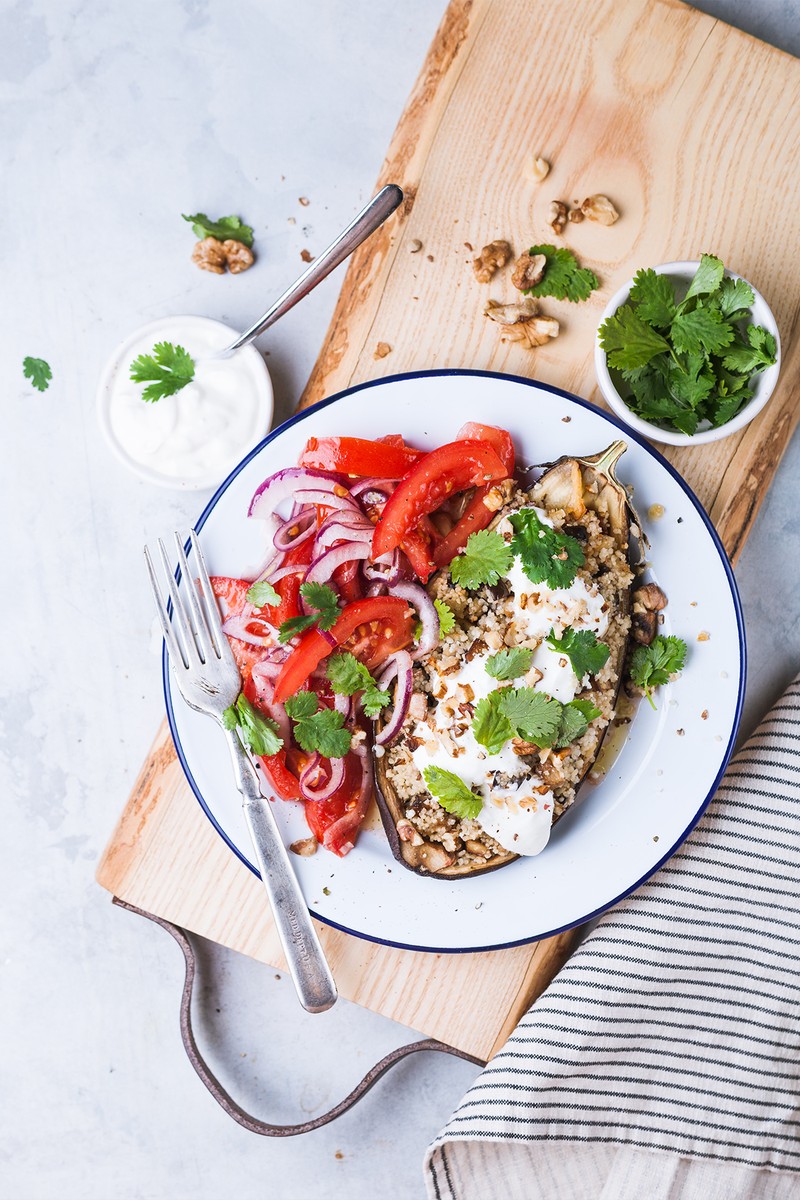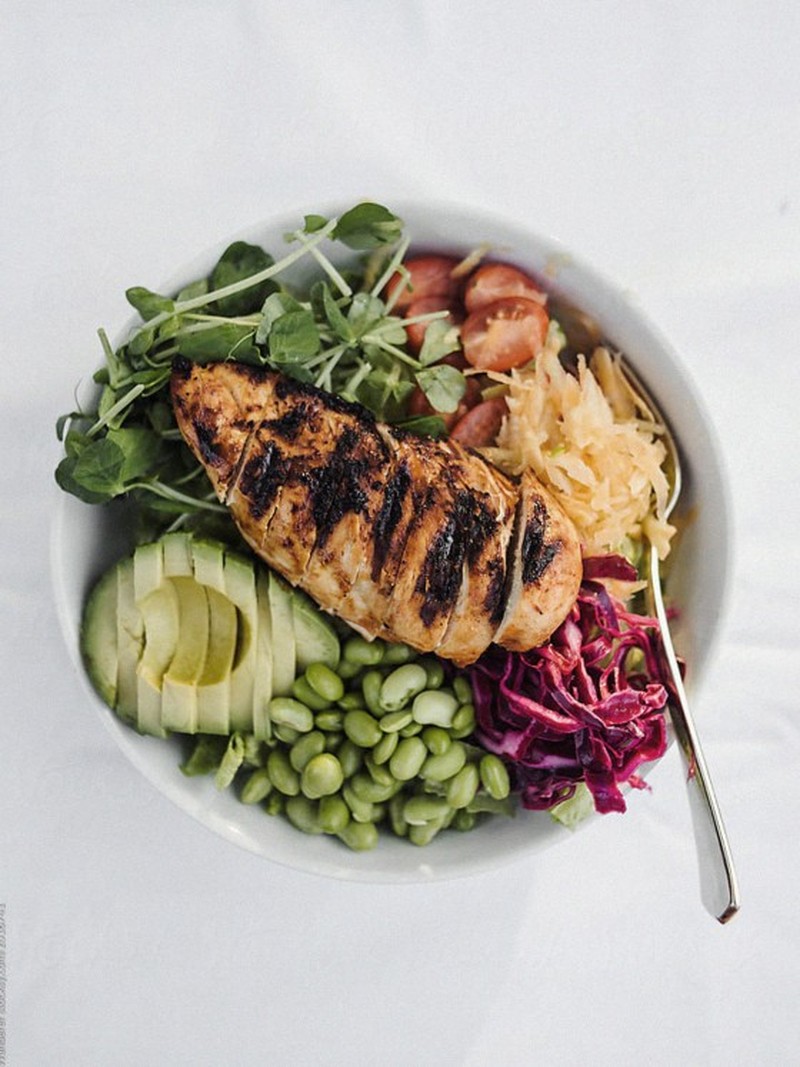A Leading Nutritionist Shares Her Top Food Rules
Aim For 30 Plants A Week
“Even better than your five-a-day, focus on getting a diverse mix of plants on your plate, aiming for 30 different plants each week. This may sound like a lot, but fruit, vegetables, legumes (beans, lentils and peas), nuts, seeds and spices all count towards your goal. The American Gut Project – one of the largest studies to research the gut microbiome – found people who eat more than 30 different types of plant foods a week have a healthier and more diverse gut microbiome than those who eat fewer than ten different plant types. Keep it simple: add a handful of spinach to a stew or curry; sprinkle a tablespoon of mixed seeds on yoghurt or salads; and top stews and soups with fresh herbs. The key is diversity – the more diverse the plant foods, the better for your gut.”
Start The Day With Oats
“Breakfast is the one meal many of us rush – or skip altogether – but starting the day on a good nutritional footing will set you up for the day ahead. A well-balanced breakfast will keep blood sugar stable and dictate your blood sugar response for the rest of the day. For convenience, keep the base of your breakfast the same, but vary the sides or toppings and introduce as many plants as you can. Oats are a great, heart-healthy staple – and are one of the most filling, affordable and nutritious breakfast options that can be made ahead of time. Increase the antioxidant content of a meal by adding fresh fruit – blueberries and kiwi are my go-to – as well as cinnamon for blood glucose control, soya milk for protein and a tablespoon of ground flaxseed for a dose of omega-3. Get into the habit of rotating the fruit you use, experimenting with dates or stewed fruit, using a variety of nuts and seeds, or adding buckwheat or quinoa to your oats.”
Swap Meat For Beans
“Removing red meat and chicken from your diet and replacing them with chickpeas, beans or lentils will significantly reduce your risk of chronic diseases. A recent report by the NHS showed that swapping as little as 3% of poultry-based protein to plant protein reduced the risk of dying, especially if there was an additional unhealthy lifestyle factor present, such as physical inactivity or being overweight. Also try replacing some grains – such as brown rice – with beans to increase your protein intake. Beans have a low glycaemic index, meaning they’ll fill you up and keep you energised for longer.”
Stock Up On Frozen Blueberries
“There is nothing wrong with frozen fruit and vegetables. In fact, anthocyanins – a type of antioxidant found in abundance in blueberries – may be even higher in frozen berries and have been linked to better brain and heart health.”
Eat In Line With Your Circadian Rhythm
“Studies show eating a larger breakfast and lunch alongside a smaller dinner is more beneficial to optimise insulin sensitivity and blood glucose control. To keep it simple, aim to have a hearty breakfast within an hour of waking and a relatively light dinner by 7pm. Leaving 12 hours between dinner and breakfast gives your digestive system a break and will promote deep, restful sleep.”

Enjoy Dark Chocolate Daily
“Flavanols – a type of antioxidant with potent heart-protective benefits – are found in many foods, but are abundant in raw cacao. To reap the benefits, eat a couple of squares of plain dark chocolate with at least 80-90% cacao daily. I rate Ombar’s chocolate, which is raw and ethically produced. You can also enjoy raw cacao nibs – an excellent source of magnesium, iron, copper, manganese and antioxidants – stirred into porridge or made into a hot drink with plant milk. Dark chocolate may be high in calories and contains saturated fat, but in moderation it is beneficial for your health. In fact, studies show flavanol intake can even reduce the risk of type 2 diabetes and improve insulin sensitivity, allowing your body to use sugar more effectively.”
Don’t Fear Soya Foods
“Many people are wary of soya-based foods like tofu and soya milk but unprocessed, or minimally processed, soya products are a fantastic addition to your diet, especially when it comes to supporting hormones. Soya has been shown to be beneficial for fertility and conditions such as polycystic ovary syndrome (PCOS), and to help reduce hot flashes in the menopause. Find a couple of tofu recipes you love and include them weekly – tofu contains 3.5 times less saturated fat than eggs and is a fantastic source of protein, iron and calcium. Tofu scramble is delicious served on wholegrain bread with a slice of avocado for healthy fats. Around two to three servings per day is safe and beneficial – one portion could be one cup of soya milk or yoghurt, miso soup, a handful of edamame beans, or 80g of tofu or tempeh.”
Load Up On Herbs
“Herbs may be small but they pack a punch in terms of nutritional value. Herbs have been prized for their medicinal properties by indigenous cultures for thousands of years, and studies continue to show their efficacy. For example, peppermint oil can soothe IBS symptoms, ginger is great for period pain and turmeric can improve brain function. By weight, dried herbs and spices average the greatest number of antioxidants of any food group, and while you may only use a teaspoon or so in a recipe, they are still a potent source of antioxidants. Fresh herbs are also great and are nutritionally on a par with dark leafy green vegetables, full of vitamins A, C and K.”
Prioritise Sleep
“Sleep and nutrition go hand in hand. What we eat or drink can impact our sleep in a variety of ways, and poor sleep is associated with weight gain. When we are sleep deprived, the hormones that affect appetite and satiety are disrupted. Research shows eating a diet high in ultra-processed foods, sugar, saturated fat and refined carbs can disrupt sleep; on the other hand, eating more fibre and unsaturated fats – think nuts, seeds, olive oil and avocados – seems to have the opposite effect, helping to promote sound sleep.”
Have Sweet Potatoes For Dinner
“Complex carbohydrates – like sweet potato and wholegrains such as brown rice – increase levels of serotonin, our feel-good hormone. Serotonin is the precursor to melatonin, the hormone produced naturally by the body that induces sleep, so eating complex carbs may also improve sleep. Enjoy a quinoa salad for dinner or add sweet potato to soups and stews.”
Be Careful If You’re Going Gluten Free
“Carbohydrates are a key component of a healthy diet and the body’s primary fuel, but the type you choose makes a difference. Opt for complex carbohydrates such as wholegrains including brown rice, wholewheat pasta and oats as well as starchy vegetables such as pumpkin and potatoes with the skin on. Moreover, there’s no need to cut gluten unless you have been diagnosed with coeliac disease, which affects 1% of the Western population. Non-coeliac gluten sensitivity is an issue which is still being researched, but it’s not life-threatening and there’s no reliable test to confirm a diagnosis. Wholegrains – like wholemeal bread and oats – are a powerful tool for reducing the risk of many diseases given the high amounts of fibre and micronutrients they contain. Removing gluten from the diet may lead to a greater consumption of refined gluten-free products and result in fewer wholegrains being consumed. If you are gluten free, enjoy grains naturally free from gluten, such as quinoa, red rice, amaranth, buckwheat and teff. When it comes to pasta, stick with buckwheat pasta, which is higher in protein, fibre and micronutrients than other gluten-free pastas made from refined rice and corn flour.”
For more information and healthy eating inspiration, visit RohiniBajekal.com & follow @RohiniBajekal on Instagram.
DISCLAIMER: Features published by SheerLuxe are not intended to treat, diagnose, cure or prevent any disease. Always seek the advice of your GP or another qualified healthcare provider for any questions you have regarding a medical condition, and before undertaking any diet, exercise or other health-related programme
DISCLAIMER: We endeavour to always credit the correct original source of every image we use. If you think a credit may be incorrect, please contact us at info@sheerluxe.com.


